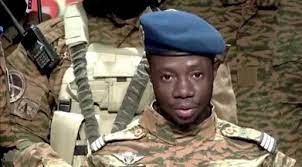Paul-Henri Sandaogo Damiba seized power in Burkina Faso after deposing civilian President Roch Christian Kabore on Monday, casting the spotlight on the 41-year-old Lieutenant Colonel.
In September 2015, this senior infantry officer of the Burkinabe Armed Forces had opposed the aborted coup attempt against the government of Michel Kafando.
Seven years later, Paul-Henri Sandaogo Damiba sprang into action to overthrow President Roch Marc Christian Kabore, who was re-elected for a second term in November 2020.
What could have motivated this loyalist to seize power by force of arms?
According to a group of soldiers who appeared on public television, the “deteriorating security situation” and the “obvious incapacity of the government” to deal with it are factors that threaten “the foundations of the nation.”
Led by demonstrators who burned the headquarters of the ruling People’s Movement for Progress (MPP) on Saturday, the junta said it had no choice but to take responsibility by ending Kabore’s presidency on Monday afternoon.
A new putsch in this landlocked Sahel state, mired in a security crisis linked to the jihadist threat since 2015 is spreading in the region.
The new strongman of Ouagadougou assumed power under the so-called Patriotic Movement for Safeguard and Restoration (MPSR).
The coup was completed after a turbulent weekend marked by Mr. Kabore’s arrest on Sunday night.
In a handwritten letter the deposed president handed in his resignation relayed by national television in “the best interests of the nation.”
Anger among the troops has been perceptible since the bloody attack on Inata in November by jihadists, which left some 50 soldiers dead.
The soldiers criticised the inability of the government to deal with the jihadist threat.
On Sunday, a few hours before they seized power, they demanded the departure of the army chiefs and the introduction of “appropriate means” to fight effectively against jihadists active in the Sahel strip.
Paul-Henri Sandaogo Damiba, who led the coup, is a graduate of the Paris Military Academy.
The lieutenant colonel is among the foreign officers who graduated from the 24th Class of the Paris war school in 2017.
He also holds a Master 2 in Criminal Sciences from the ‘Conservatoire National des Arts et Métiers’ (CNAM) in Paris and a Defence Expert Certification in Management, Command and Strategy.
That is a rich background that facilitates his rise to power within the army.
In 2011, he landed a role in the Presidential Security Regiment (RSP), the Praetorian Guard of former President Blaise Compaoré finally disbanded in 2015 after the abortive coup against Michel Kafando.
As then president of the transition between July 2014 and November 2015 Kafando owed the failure of the coup in large part to Damiba and other officers who prevented the insurrection by General Gilbert Diendere, currently in prison from succeeding.
As recently as early December, President Kabore overhauled the military hierarchy and appointed Lieutenant Colonel Paul-Henri Sandaogo Damiba to the strategic position of head of the country’s anti-terrorism apparatus.
This decision was taken after the attack on Inata in November, which left 57 dead, including 53 gendarmes.
A specialist in terrorism, Damiba is the author of a book published last June and entitled West African Armies and Terrorism: Uncertain Responses, in which he analyzes counter-terrorism strategies in the Sahel and their limitations.
Will his many hats as commander of the country’s third military region, head of the anti-terrorist apparatus and head of security in Ouagadougou be enough to get Burkina Faso out of this political and security quagmire?
Only time will tell.
CD/fss/as/APA


